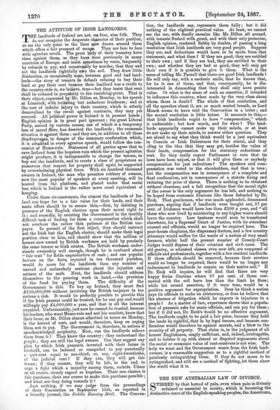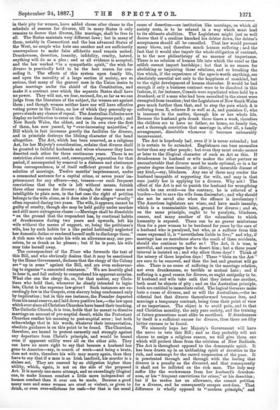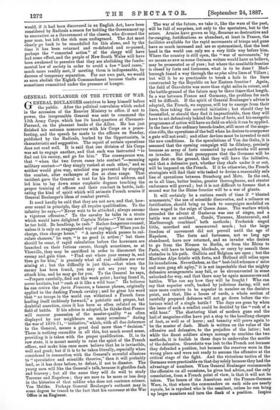THE NEW AUSTRALIAN LAW OF DIVORCE.
STIRRED by that hatred of pain, even when pain is divinely ordained or essential to society, which is becoming the distinctive craze of the English-speaking peoples, the Americans,
in their pity for women, have added clause after clause to the schedule of reasons for divorce, till in many States it only remains to decree that divorce,. like marriage, shall be free to all. The States maintain very different laws ; but in many of them, notably in Connecticut and the less advanced States of the West, no couple who bate one another and are sufficiently unscrupulous to make false affidavits need remain united. Drunkenness, desertion, insanity, infidelity, cruelty, hatred, anything will do as a plea ; and as all evidence is accepted, and the law worked "in a sympathetic spirit," the wish for divorce is practically held to be the best reason for con- ceding it. The effects of this system upon family life, and upon the morality of a large section of society, are so serious, that many of the gravest men in the Union desire to place marriage under the shield of the Constitution, and make it a contract over which the separate States shall have no power. They will not, we fear, succeed, for, so far as we can judge from the literature of the subject, the women are against them ; and though women neither have nor will have effective voting power in the Union, no law of which they generally ap- prove stands any chance of repeal. The Australian Colonies now display an inclination to enter on the same dangerous path ; and New South Wales, the oldest, and in its own view the first of them, has now passed, by "ever-increasing majorities," a Bill which in fact increases greatly the facilities for divorce, and in principle destroys the lifelong character of the bond altogether. The Act, which has been reserved, as a religions Act, for her Majesty's consideration, ordains that divorce shall be granted to faithful husbands and wives whenever they have deserted each other for three continuous years. There is no restriction about consent, and, consequently, separation for that period, if accompanied by removal to a distance and abstinence from correspondence, is of itself sufficient ground for a dis- solution of marriage. Twelve months' imprisonment, under a commuted sentence for a capital crime, or seven years' im- prisonment for any offence—say, treason—or such frequent convictions that the wife is left without means, furnish three other reasons for divorce ; though, for some cause not intelligible to plain men, in the last case the right of petition belongs to the wife alone, as it does also if she alleges" cruelty " often repeated during two years. The wife, it appears, cannot be guilty of cruelty, though she may be held guilty under another and still more outrageous clause :—Marriage shall be dissoluble "on the ground that the respondent has, by continual habits of drunkenness during two years and upwards, left his wife without the means of support, or, being the petitioner's wife, has by such habits for a like period habitually neglected her domestic duties or rendered herself unfit to discharge them." A rich man who can make his wife an allowance may, one per- ceives, be as drunk as he pleases ; but if he is poor, his wife may take herself away.
The correspondent of the Times who forwards the text of this Bill, and who obviously desires that it may be sanctioned by the Home Government, declares that the clergy of the Colony are " up in arms " against the Bill, and are even endeavour- ing to organise" a concerted resistance." We are heartily glad to hear it, and fail entirely to comprehend his apparent surprise. What else can the clergy do, or, for that matter, any Chris- tians who hold that, whenever he clearly intended to legis- late, Christ is the supreme law-giver I Such instances are ex- ceedingly few in the Gospels, even slavery being condemned only by implication ; but in this one instance, the Founder departed from his usual reserve, and laid down positive law,—the law upon which ever since all Christian Churches have based their teaching. The Catholic Church, it is true, holds that he meant to dissolve marriage on account of pre-nuptial deceit, while the Protestant Churches confine his meaning to post-nuptial error ; but both acknowledge that in his words, whatever their interpretation, absolute guidance is on this point to be found. The Churches, therefore, are bound to protest earnestly and strongly against any departure from Christ's principle, and would be bound even if apparent utility were all on the other aide. They can have no more right to say that because a husband has gone to America—say, in search of work—and being a brute, does not write, therefore his wife may marry again, than they have to say that if a man is an Irish landlord, his murder is a sinless act. They are coerced by an obligation higher than utility, which, again, is not on the side of the proposed Act. It is merely one more attempt, and an exceedingly illogical one, to make human comfort a little more independent of human conduct than it ever can be made. Because a good many men and some women are cruel or violent, or given to drink, or even over-solicitous for oaah—for that is the usual,
cause of desertion—an institution like marriage, on which all society rests, is to be relaxed in a way which must lead to its ultimate abolition. The Legislature might just as well decree that if a creditor knocked his debtor down, the debtor's acceptances should all be cancelled. That law would prevent many blows, and therefore much human suffering ; and the fact that it would also impair the whole obligation of contract, is to the new philanthropy of no manner of importance. There is no relation of human life into which the cruel or the selfish cannot import hardships • but that is no reason for abolishing or impairing those relations, and so breaking the ties which, if the experience of the ages is worth anything, are absolutely essential not only to the happiness of mankind, but to the right development of human character. It would be bad enough if only a business contract were to be dissolved in this fashion, if, for instance, Console were repudiated when held by a drunkard, or if a man who had been assaulted in the street were exempted from taxation ; but the Legislature of New South Wales goes much further than that, and to stop the pain which A is suffering from B, relieves B as well as A, and punishes 0, who is innocent in the matter, through his or her whole life. Because the husband gets drunk three times a week, therefore the children are to have no father, no home, no family ties, and a thorough conviction that marriage is, after all, a family arrangement, dissoluble whenever it becomes unbearably inconvenient.
The Act is hopelessly bad, even if it is never extended ; but it is certain to be extended. Englishmen can bear anomalies better than any other people; but even they must awake sooner or later to the illogical character of such an Act as this. If drunkenness in husband or wife makes the other partner so uncomfortable that divorce must be made optional, so in a far greater degree does insanity, or idiotcy, or incurable disease of any kinde—say, blindness. Any one of these may render the husband incapable of supporting the wife, and may in that case justify her in applying for a divorce. Why not The effect of the Act is not to punish the husband for wrongdoing which he can avoid—on the contrary, he is relieved of a burden—but to save the wife from discomfort ; and why should she not be saved also when the offence is involuntary The American legislators are wiser, and have made insanity, which is a transmissible taint, ground for divorce ; and so, on the same principle, ought to be paralysis, blindness, cancer, and many another of the calamities to which humanity is exposed. There can be no graver misfortune than for a poor woman to be burdened for years by the care of a husband who is paralysed, but who, as a sufferer from this cause expressed it, is "nevertheless liable to live ;" and why, if marriage has no sacredness above the reach of these accidents, should she continue to suffer so V The Act, it is true, is merciful, and encourages her to desert him ; but a three years' interval is insisted on ; and why allow three days' / Think of the misery of three hopeless days! These "blots on the Act" are sure to be removed, and then the last and greatest will go also. There is no cause of suffering in the marriage relation, not even drunkenness, so terrible as mutual hate ; and if suffering is a good reason for divorce, so ought antipathy to be. If husband and wife take oath that they detest one another, both must be objects of pity ; and on the Australian principle both are entitled to immediate relief. The logical Germans make hate a cause of divorce, and so will the Australians,—the in- cidental fact that divorce thenceforward becomes free, and marriage a temporary contract, being from their point of view of no importance. The object is to avoid pain, and to that end Christian morality, the only pure society, and the training of future generations must alike be sacrificed. If drunkenness by itself is a sufficient excuse for divorce, then there are fifty better excuses to be found.
We sincerely hope her Majesty's Government will have the nerve to veto this Bill ; and as they probably will not choose to assign a religious reason, we will give them one which will protect them from the criticism of New Radicals. The Act is throughout opposed to the democratic spirit. It has been drawn up in an unblushing spirit of devotion to the rich, and contempt for the sacred corporation of the poor. It is penetrated through and through with the feeling that divorce is a penalty on the divorced, and that consequently it shall not be inflicted on the rich man. The lady may suffer like the workwoman from her husband's drunken- ness, or his " frequent convictions for crime," or his desertion ; but if he makes her an allowance, she cannot petition
for a divorce, and he consequently escapes soot-free. That difference is wholly opposed to "modern principle"' and
would, if it had been discovered in an English Act, have been considered by Radicals a reason for holding the Government up to execration as a Government of the classes, who divorced the poor man, but left the rich man undisgraced. The Act must clearly go back to be remodelled for this alone, and by the time it has been returned and re-debated and re-passed, perhaps the "concerted action" of the clergy will have had some effect, and the people of New South Wales will have been awakened to perceive that they are abolishing the funda- mental law of society in order to avoid a few " hard cases," much more readily met, if meeting them is indispensable, by decrees of temporary separation. For our own part, we would as soon abolish the Eighth Commandment because thefts are sometimes committed under the pressure of hunger.




































 Previous page
Previous page